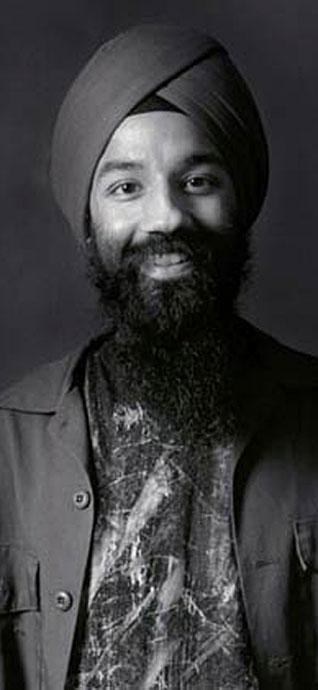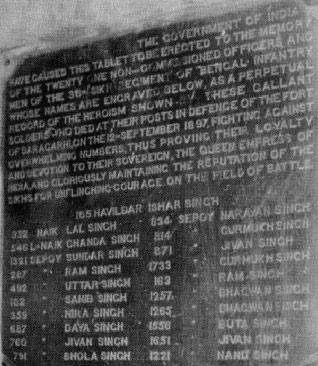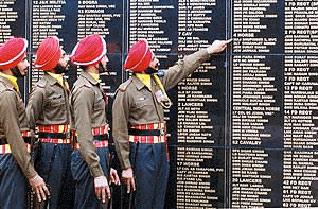
Sonny
Singh
Above photo - courtesy, Amy Touchette. Below - roll calls of fallen Sikh soldiers: Singhs, all!


Faith
The Singh Song(h)
or Singh: Reclaiming My Roots,
and My Name
by SONNY SINGH
My whole life, "Singh" has been my middle name, often amounting to just a middle initial. The last name, passed down by my father, was always much more predominant and visible.
About a year ago, I started making an intentional effort to always use "Singh" in my name, followed by my last name. And now I have decided to drop my given family name altogether.
A little history: On April 14, 1699, a day that's today honoured as one of the Sikh holidays, Guru Gobind Singh (the tenth Sikh Guru), along with thousands of other Sikhs, created the Khalsa, a collective body of armed revolutionaries, warrior-saints, whose mission it was to overthrow tyranny in all its forms. In addition to codifying the Khalsa uniform, including unshorn hair and the turban, Guru Gobind Singh gave us new names: Singh and Kaur - Lion and Lionness.
Because so many South Asian (and especially Hindu) last names indicate caste, 400 years ago, Sikhs abandoned their last/caste names altogether - deeply personalizing an ideological commitment to equality.
I am proud to be a Sikh.
Sikhism, at its core, is a revolutionary faith and way of life. Some 550 years ago, Guru Nanak, the founder of Sikhism, and his followers, sought to end perhaps the most ancient form of oppression in South Asia - caste.
Tearing down the caste system and other forms of tyranny is why free-thinkers like Guru Nanak Sahib and those around him (many of whom were lower caste Hindus) came together to forge something new.
In short, it's literally why Sikhism was born. The creation of the Khalsa and Sikh identity as we know it, on Vaisakhi Day 1699, was the culmination of what Guru Nanak and his followers started.
I've known this history for most of my life, but never thought too much about why I, and so many other Sikhs around me, used Singh and Kaur as their middle names instead of their last names. And I certainly never suspected that my last name had anything to do with caste.
But my bubble burst last year when I started organizing in the Sikh community in Queens and saw how caste is still so pervasive amongst Sikhs.
For example, the gurdwaras in Richmond Hill, Queens (New York, U.S.A.), which has the largest concentration of Sikhs in the area, are actually split up by caste.
While caste boundaries are not strictly enforced in these spaces, caste ideology is one of the main forces that divides the leadership and leads to the creation of new gurdwaras.
Similarly, when many Sikhs are looking to get married, whatever they may have learned about all people being equal goes out the window, as caste is often a major criteria in finding the "right" partner. This is all totally in direct contradiction of why we exist as Sikhs in the first place.
I've been in a slow process of thinking about how this all relates to my own life, and yes, my own name. It turns out that the last name I have been using my whole life probably does have some caste roots, which I don't care to hold onto.
So I dropped my last name as a concrete way of getting rid of caste association at the personal level.
This Vaisakhi 2009, I'm taking a small step to abandon my roots. But in doing so, I am choosing to embrace much more meaningful roots that make me proud to be a Sikh and proud to be a revolutionary.
How do you know I'm for real? I've changed my name everywhere it counts: in my professional and public life, in my email addresses, even on Facebook.
[Sonny Singh is a community organizer with The Sikh Coalition in New York.]
This piece, here edited for sikhchic.com, was first published on Race Wire under the title, 'Singh: Reclaiming My Roots, And My Name': http://www.racewire.org/archives/2009/04/singh_reclaiming_my_name.html.
April 14, 2009
Conversation about this article
1: Chintan Singh (San Jose, California, U.S.A.), April 14, 2009, 7:27 PM.
I have made deliberate efforts in the last few years to abandon my family last name and use 'Singh' as my last name. I continue to struggle because my Indian passport still carries my family last name. Hopefully it can be rectified when I get a new passport.
2: Gurjender Singh (Gaithersburg, U.S.A.), April 15, 2009, 7:53 PM.
By having the last name as Singh, sometimes it is confusing in the U.S.A., if the spouse's last name is Kaur and various documents refer to her by the last name 'Singh'. [Editor: So? Are there no ther solutions to this miniscule irritant? Surely, we need to give a bit more thought to things before we bring down our own traditions and values!]
3: I.J. Singh (New York, U.S.A.), April 16, 2009, 11:41 AM.
Look around, in this country many women retain their maiden name after marriage. I remember it caused some consternation when the trend started, but not any more. So why can't a Sikh woman remain "Kaur" after marriage? I know my mother did. This question was raised when I sponsored my parents for coming to the United States. The bureaucrats, for both visa and citizenship requirements later, were easily satisfied when I told them that, in theory, our womenfolk had been liberated centuries earlier.
4: Gurbux Singh (Chatsworth, U.S.A), April 16, 2009, 3:27 PM.
'Singh' and 'Kaur' are our names and caste has no place in it. When our daughter Danbir was born in Springfield, Illinois, they said that the wife must have the husband's last name. From 'Ranjit Kaur' she bacame 'Ranjit Kaur Singh' and our daughter became 'Danbir Kaur Singh'. We never had another last name as our name was always 'Kaur' and 'Singh'. Proud to be Sikhs.
5: Gurjender Singh (Gaithersburg, U.S.A.), April 16, 2009, 7:17 PM.
I agree with I. J. Singh ji's comments. Whereas, as mentioned by Gurbax Singh ji, if women have to take the last name as Singh with Kaur, then the whole purpose of values and tradition is lost. This problem cannot be resolved by a few Sikhs. This needs to start with the Akal Takht and other Takht leaders.
6: Gurinder Singh Johal (Amritsar, Punjab), June 05, 2009, 7:35 AM.
The blight of the Hindu caste system is not just residued in our names. It is not going to go away easily; after 500 hundred years, some Sikhs are still very much stuck to their castes in their marriage practices. A lot still needs to be done. As far as the 'clan's name is concerned, it is mostly being used as a third name to differentiate when the first name too is a common one. The fact that many politicians use their village name as their third names does not mean that they are not weighed down by clan/caste affliations.
7: Surrinder Singh (London, England), August 02, 2009, 12:27 PM.
My parents gave me the surname Kaur Singh, no other name, as my parents do not believe in caste. However, I have always used Singh and am regularly referred to as Mr. Singh in email correspondence, which I find quite amusing, funnier still when those associates then get to meet me. This does not bother me in the least. I also know of family members who have been referred to as Mr. Kaur. This is just ignorance and should not be taken too seriously. People need educating, that's all. I contradict myself now and say that whatever your name, you can't change some of our own people's thought processes. We are all Sikh so why then do some older folk not accept their children, grandchildren marrying someone who is of another caste. These are the poeple who also consider themselves very religious! My parents disregarded the caste system by giving me the name Kaur Singh but I still get asked about my caste. My response is always the same: I am Sikh!


